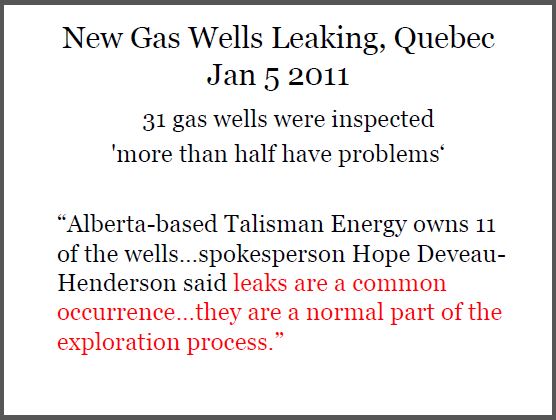Questerre Energy CEO pitches fracking project in Quebec by Nicolas van Praet, November 3, 2014, The Globe and Mail
Despite lingering public skepticism toward shale gas development in Quebec, the head of the province’s oil and gas association is pitching preliminary plans for a home-grown gas production project he says could help prevent shortages. “There is no doubt that Quebec pays a high price for natural gas – for their schools, for their hospitals, for their industry,” [With gas prices at record lows and dropping fast? And with so many peer-review papers coming out proving the significant health and water harm from frac’ing, is it more economical to avoid using frac’d oil and gas?] said Michael Binnion, chief executive of Calgary-based Questerre Energy Corp. and head of Quebec’s oil and gas lobby. “And that wasn’t as big a problem in the past as it is today. There are [usage] curtailments here every winter and there have been for 50 years.”
During a speech Monday to industry and government officials who were gathered for the Association pétrolière et gazière du Québec’s annual conference, Mr. Binnion presented his vision for a natural-gas production project in Quebec that could be tapped in spurts when required to meet the needs of local consumers and industry. He said it would be a small-scale project starting with some 10 wells drilled using hydraulic fracturing techniques and requiring a total of between $100-million and $200-million in investment. The wells would be set up in a non-urban community that supports the plan, he said.
The proposal highlights the extent to which Questerre and other non-conventional oil and gas developers remain active in thinking about how to breathe life into their industry in Quebec despite a nearly three-year moratorium on shale gas drilling and fracturing in the St. Lawrence River Valley. Questerre alone holds development rights to more than one million gross acres of farmland in the province.
“We have to show investors that production is possible here [in Quebec],” Mr. Binnion said. “This is one possible way for us to use local energy to solve a local energy problem.” [Aren’t the people forced to live with the damages, contaminated water, health harm and lost property values much more important than investors?]
Quebec has enough natural gas to meet its own needs for an estimated 100 years or more, most of it concentrated in the province’s portion of the Utica shale formation along the southern flank of the St. Lawrence River. But it remains untapped after significant public opposition to early drilling efforts, forcing Quebec to buy its gas from producers in Western Canada. Unlike Ontario, the province has limited gas storage capacity. Mr. Binnion said his supply proposal is designed to replace the need for storage, since the wells could be tapped whenever gas is needed.
Past opinion polls have shown Quebeckers have among the lowest support for fracking of all Canadians. Mr. Binnion said Monday, however, that he believes the emotional intensity of the initial opposition to shale gas in Quebec has diminished.
The province imports more than five billion cubic metres of natural gas per year and consumption can double during the winter, said Pierre-Olivier Pineau, an energy specialist at Montreal’s HEC business school.
“It’s always hard to get enough natural gas during the winter, and it will become even harder in the context of TransCanada converting their natural-gas pipeline to an oil pipeline [with the Energy East project],” Mr. Pineau said. “So in this context, saying you can relieve the peak gas issue by having some marginal production during these periods, that makes a lot of sense.”
According to Quebec’s oil and gas association, natural gas represents 12 per cent of the province’s total energy consumption. About 130,000 households in the province use the resource, mostly for home heating and cooking. Industry, including a new $1.2-billion fertilizer project proposed by the Indian Farmers Fertilizer Co-Operative (IFFCO), is adding to demand pressure.
A government-mandated environmental agency is studying the safety and impact of natural-gas fracking in the St. Lawrence lowlands and its findings are due before the end of the year. Mr. Binnion cautioned that his vision for the project could change depending on what that report says. [Emphasis added]
[Refer also to:

Slide from Ernst presentations
“Drilling Deeper,” a massive, 300-page report by energy analyst and B.C. resident David Hughes, finds the boom in tight oil and shale gas plays in the United States will not last long, nor deliver energy independence to that country. … False promises surrounding these extreme hydrocarbons has led to a tempering of investments in renewable energy along with truncated public policy on climate change, explains the energy analyst.hydraulic fracturing. [Emphasis added]
No fracking, even for research, recommends Quebec committee report
Quebec should say no to all hydraulic fracturing: report
Fracking tour fails to sway Quebec farmers
Shale gas: the RCMP and CSIS on high alert
Gas in your maple syrup, Du gaz dans ton sirop
Fracking banned by Quebec government
“I don’t foresee a day when there will be technology that will allow safe exploitation (of shale gas),”
The man who did not know Quebec, L’homme qui ne connaissait pas le Québec
On Michael Binnion of Questerre Energy: Every time he opens his mouth, Mike insults us.
